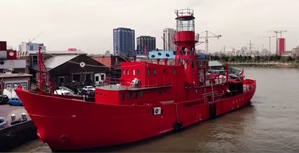- in Acoustics , Gear , Studios by Bobby Owsinski
How Would You Like To Record On A Ship?
 I’m very fond of cruising and will take every chance I can to get back on the ocean. It’s a great place to work (although the internet connection can be a bit slow) and I find I get a lot done in a very relaxed manner. That’s why the idea of a recording studio on a ship intrigues me, as I can think of no better place than on a ship to get creative.
I’m very fond of cruising and will take every chance I can to get back on the ocean. It’s a great place to work (although the internet connection can be a bit slow) and I find I get a lot done in a very relaxed manner. That’s why the idea of a recording studio on a ship intrigues me, as I can think of no better place than on a ship to get creative.
A lot of people have tried to put a recording studio on a ship in the past and no one until now has managed to pull it off. That said, meet Soup Studio in the video below. It’s built into what was Lightship 95 (a lighthouse on a ship) now moored on the Thames River outside of London. I know that David Gilmour of Pink Floyd has a studio on a houseboat (called Astoria) also docked in the same area, but Soup Studio is distinctly different as you’ll see in the construction details in the video.
One of the reasons why having a studio on a boat or ship is borderline impractical is the affects of the saltwater on normal electronic equipment, which corrodes very quickly unless it’s marine-hardened. The famous Cherokee Studios (always a cutting edge facility at the time) found that out in the 1980’s with a ship studio venture in the Port of Los Angeles. Corrosion in the wiring meant that there was never a good solid electronic connection that lasted so the audio quality suffered enough that the Robb brothers (owners of Cherokee) soon determined that it would never meet the standards of their studio in Hollywood and gave up.
There’s been a lot of advancements in all aspects of audio gear in the last 35 years (especially cable technology), so perhaps corrosion isn’t the factor that it once was. Still, it’s best to have a good maintenance staff on call.

